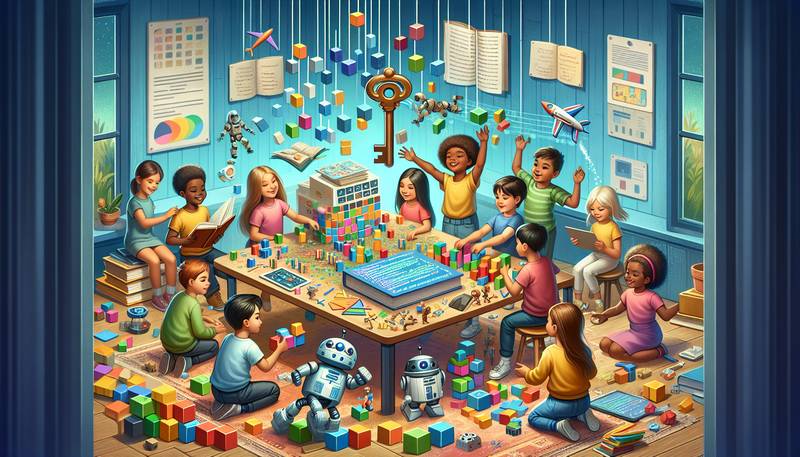Teaching Kids Coding Through Fun Activities

Why Coding is Essential for KidsCoding is the magical gateway to understanding how the digital world ticks, much like realizing that the oven doesn't actually run on fairy dust. In a world increasingly driven by technology, teaching kids coding is akin to handing them a universal remote—for life! They don’t just get to watch the action; they learn to control it. It’s like being given the keys to a car without the parental advisory. The skills they acquire aren't limited to programming languages; they learn problem-solving and critical thinking. Think of it as a workout for their brain—minus the sweat and the strange looks from the neighbors when they try to do brain exercises outside. Fun Activities to Teach CodingTo make coding as appealing as the last slice of pizza, here are some engaging activities:- Code a Story: Let kids create their own interactive story using coding tools like Scratch. It’s storytelling but with a twist; who wouldn’t love a story where the hero trips over their own cape?
- Robots on a Mission: Use simple robotics kits to let kids build and program their own robots. Nothing says “I’m a genius!” quite like a robot that delivers snacks (or at least a well-aimed paper airplane).
- Coding Board Games: There are games specifically designed to teach coding concepts without a computer. It’s like Monopoly but without the family feuds over properties and “who accidentally bought Park Place.”
- App Development: Encourage kids to brainstorm ideas for their own apps. Who knows? They might come up with the next must-have app for tracking how many times Dad forgets to take out the trash.
Keeping It EngagingEngagement is key; otherwise, teaching coding could resemble trying to teach a cat to fetch. Kids need to see the relevance of coding in everyday life. Use examples from games, apps, and tech they encounter daily. For instance, show them how coding powers their favorite video games. The idea of coding their own game might just inspire them more than a cat video on YouTube. Utilizing gamification techniques can help maintain interest. Let’s face it—if kids can level up in a game, why can’t they level up in coding? Creating badges or points for completing coding challenges can turn learning into a competitive sport. Just be careful not to incite a full-blown coding Olympics; no one wants to see kids arguing over who should get the gold medal in “Python Programming.”Real-World ApplicationsWhile coding can seem like a mere collection of symbols and lines, its real-world applications are as varied as the ice cream flavors at your local shop. Kids can learn how to build websites, analyze data, or even create their own video games. Understanding coding can lead them down career paths they never knew existed. It’s as if you handed them a treasure map, and instead of “X marks the spot,” it says “X = a well-paying job!”Incorporating real-world scenarios into coding lessons not only makes it relatable but also shows them why they should care. Whether it’s growing up to be the next tech guru, a wannabe game designer, or just someone who wants to automate their chores (because who doesn’t want a robot to clean their room?), the sky’s the limit. Common Pitfalls to AvoidEven the best-laid plans can hit a snag or two. Here are some traps to sidestep when teaching kids coding:- Overcomplicating Things: Avoid diving into complex concepts too soon. It’s like trying to teach a baby how to speed skate—best to start with crawling first.
- Lack of Patience: Coding can be frustrating, even for adults. Kids will likely want to throw their computer out the window at some point; it's a rite of passage. Try to remind them the only bug they should worry about is the one flying around their snack.
- Neglecting to Celebrate Small Wins: Achievements, no matter how tiny, should be celebrated. If your kid figures out how to make a character jump, throw a mini dance party! It’s not just fun; it builds motivation.
Leveling Up Your Coding SkillsIn the quest for coding knowledge, remember that the learning journey never truly ends. With technology evolving faster than a cheetah on roller skates, staying updated is essential. As kids dive deeper, they might find themselves equipped with skills to enter fields like artificial intelligence or cybersecurity. Just think of the potential—a kid who understands how to code their own video game may soon be programming your smart fridge to remind you when you’re out of ice cream. As they venture into this coding realm, it’s not just about the skills they obtain; it’s the adventures they’ll embark on, the friendships they'll forge, and the latent magic waiting to be discovered. In decoding the universe of programming, kids aren’t just learning—they’re preparing for a future that’s as bright as a well-lit computer screen at 2 AM!
|
|







